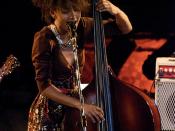In her book The House on Mango Street, Sandra Cisneros demonstrates the obstacles facing women in Esperanza's culture, and the ways in which they affect Esperanza. Many females in Mango Street are dependent on men to escape Mango Street with only a few exceptions. Although Esperanza grows up in that community, she is able to overcome the limitations of her gender and emerges as a strong and independent young woman.
Esperanza's role models such as Marin and her neighbors are not independent or strong. Marin puts all her energy into "catching" a man because that is how she believes that she will be able to leave the neighborhood. Wearing lots of make up and devoting all her attention to men and her girlish fantasies, she plans to meet a man on a subway and live in a nice home with him. She hopes for a man just as a little girl wishes to be a princess, rescued from her imprisoning tower by a handsome prince.
Similar to Marin, Rafaela is also dependent, but in a different way. Esperanza says, "Rafaela leans out the window and leans on her elbow and dreams her hair is like Rapunzel's"(79). She is locked in her house because her husband thinks she will run away because she is so beautiful. Sally met a man, married him, moved away from Mango Street and is still miserable, completely spineless against her new husband. Sally made Esperanza realize how real the possibility of unhappiness in life for her was. It motivated her more than ever to defy the norm and make it on her own, independent and powerful. Esperanza realizes that happiness is not guaranteed in marriage. Esperanza knows about her great grandmother. He great grandmother was strong, independent, and wild, but she was taken and married...


